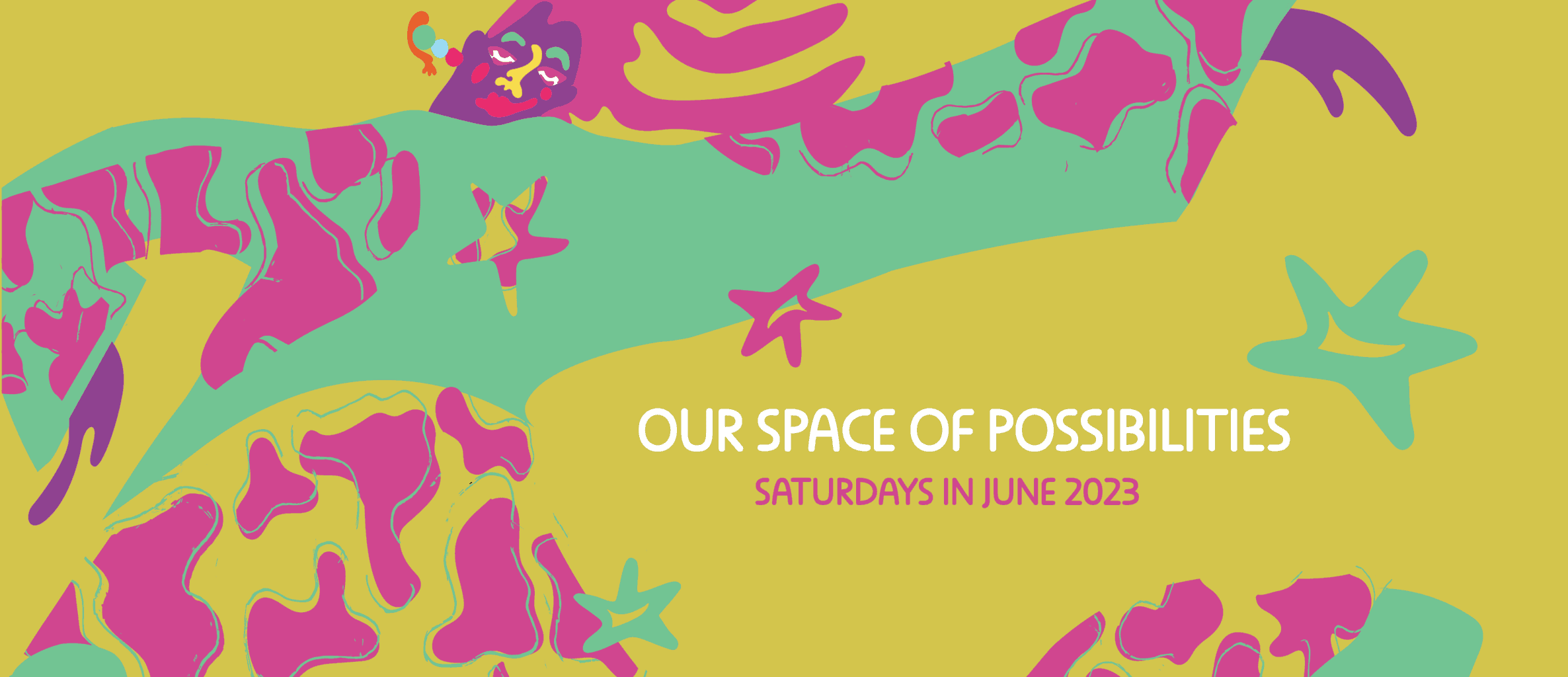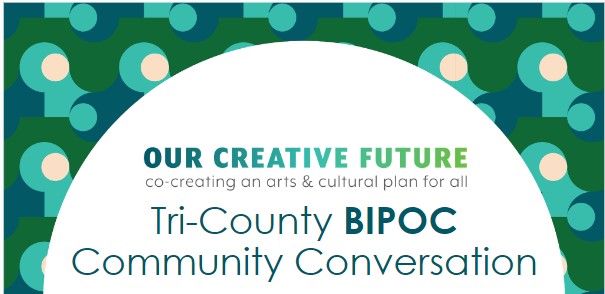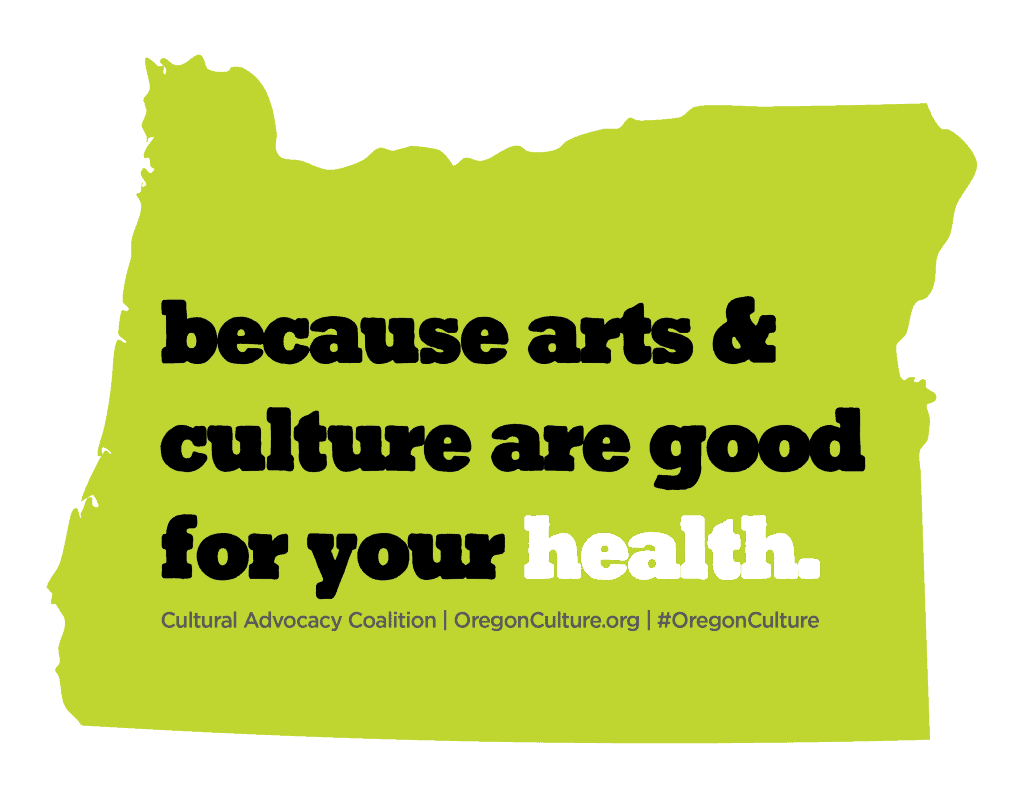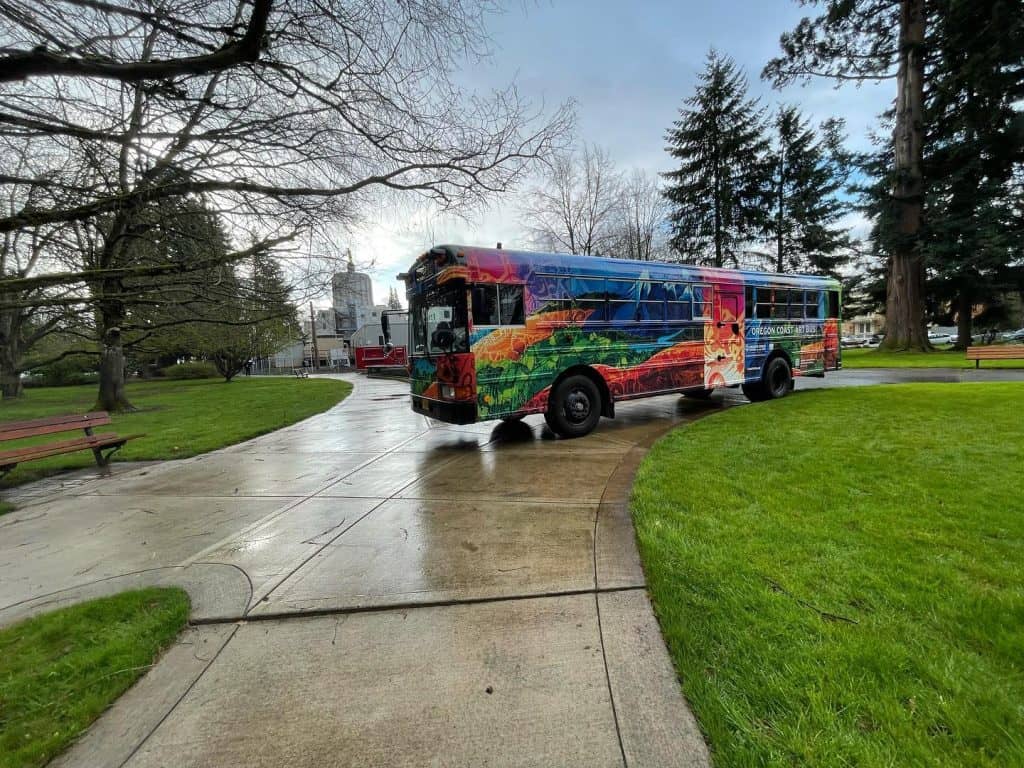
Every Saturday this June, we invite you to celebrate the communities along the East Portland Cultural Corridor through arts and culture at Our Space of Possibilities. This corridor is located on SE Division Street, spanning from SE 82nd Ave to SE 175th Ave. The project is supported generously by the National Endowment for the Arts’ Our Town grant, matched with local funding from Regional Arts & Culture Council, Portland Bureau of Transportation (PBOT), and TriMet.
Our Space of Possibilities lies at the core of the East Portland Cultural Corridor initiative. Envisioned by artist-in-residence Patricia Vázquez Gómez, the project is a dynamic cultural space housed within a transformed TriMet bus that will live at four locations along SE Division Street. Every Saturday from June 3rd to June 24th from 12-8 pm, you will have the opportunity to join a workshop, attend a screening, watch a performance, or view an exhibition curated by local East Portland organizations and residents.
Patricia Vázquez Gómez is a multidisciplinary artist exploring the intersection of aesthetics, ethics, and politics; the social functions of art and the expansion of community-based art practices, with her methodologies deeply informed by her experiences in immigrant rights and social justice movements in the US and Mexico.
Southeast Division Street serves as the geographic backbone of a diverse and growing community, now with improved transportation options for residents thanks to TriMet’s FX2-Division high-capacity bus service. By seamlessly intertwining people, culture, and transportation, the East Portland Cultural Corridor strives to nurture a resilient community and celebrate the unique cultural identity of East Portland.
Our Space of Possibilities
Every Saturday in June from 12-8 pm
- June 3rd at SE Division and 166th Pl
- June 10th at: SE Division and 138th Ave
- June 17th at SE Division and 121st Ave
- June 24th at SE 138th at SE Division St
Collaborators
Naomi Likayi, is a first-gen, Congolese American creative based in Portland, OR. She aims to create daring and exciting work, finding new ways to innovate beyond what is offered in the current state of design and illustration. Likayi’s work will be featured in Our Space of Possibilities as a bus wrap designed in collaboration with Fir Ridge High School students Lia and Ricky. Handle: @mungala_nao
Marissa Perez and Patricia Vázquez Gómez are creating the first exhibition for Our Space of Possibilities, How to Love Division, centered on the history of East Portland and the opportunities for Civic Engagement. This exhibition will be on view on June 3rd, from 12-8 pm. Handle: @marissa_perezzzzz
Friends of Trees inspires people to improve the world around them through a simple solution: Planting Trees. Together. Friends of Trees and Patricia Vázquez Gómez are creating a garden inside the bus on June 10th, open 12-8 pm. Come get a plant and learn about the environment! Friends of Trees staff Andrew, Harrison and Winnie will also be at Our Space of Possibilities to teach you how to take care of plants on June 10th, from 1-3 pm. Handle: @friendsoftrees
Amenta, Kalimah, Farados, Oniyah, José, Oak, Brian and Tito are creating an exhibition together based on Afrofuturism for Our Space of Possibilities. Amenta Abioto is a musician and producer. Originally from Memphis, TN, she came to Portland in 2010 with her artist family. Her background in musical theater helped inspire her live looping one-woman band, Yawa. She has released two projects, Opening Flower Hymns and Wade. Amenta Abioto is currently an artist in residence with her family, Studio Abioto, at the Interstate Firehouse Cultural Center. Amenta Abioto will also perform on June 17th at 7:30 pm. Kalimah Abioto (aka Dr. Woodchopper) is a multimedia teaching artist, filmmaker, drummer, writer, dancer, and entrepreneur. The Afrofuturism exhibition will be on view on June 17th, from 12-8 pm. Handles: @yawamusic, @kalimahabioto
The 082 Art Crew at Apano is an art collective of local BIPOC artists and community members creating art centered around the experiences, wants, and needs of BIPOC residents and neighbors of Southeast Portland. The exhibition the 082 Art Crew is creating for Our Space of Possibilities is called How to Love Division? This exhibition will explore how we express our love of East Portland through street art, highlighting community history and the issues of gentrification through interviews with local street artists and by asking participants questions about their relationship to East Portland in a creative way. How to Love Division will be on view on June 24th, 12-8 pm. Handle: @apanonews
Evan and Daniel are two 10-year-old students from East Portland who will be teaching origami, on June 3rd and 17th, from 1-2 pm.
Lillyanne Pham is a 25-year-old artist and cultural organizer raised by Vietnamese refugees. Ackida Omar is a 21-year-old first-generation Burundian American, artist, musician, and soccer player. LP and Ackida will lead a workshop on June 3rd and 17th, 2-3 pm; based on a short film they are creating for Our Space of Possibilities called “(Our)Flavs,” which highlights the stories of local immigrant and refugee restaurant owners and their relationships with herbs and spices. “(Our)Flavs,” will be screened on June 3rd and 17th, from 5-6 pm. Handles: @lillyannepham, @ackida_
Chanell Cortez Gonzalez is a student at Fir Ridge HS, loves art and dreams of becoming an art teacher. Chanell will be leading a surprise art workshop on June 3rd and 17th from 4-5 pm.
Medicine Bear provides spiritual guidance and cultural mentoring to at-risk youth, families, and houseless communities through traditional Native American Ceremony, Sobriety Promotion, and Education. Medicine Bear and Rudy Serna will hold a Native Circle at Our Space of Possibilities, on June 10th from 3-5 pm, for Native-American residents, workers, and students of East Portland. Handle: @rudysernaredstone
Thea Gahr is a bilingual artist and printmaker engaged in education and image-making that aims to catalyze positive social & environmental change. Thea will facilitate the creation of a collective lino carving on June 24th, 1-3 pm.
Aden Catalani is a Portland painter who will lead a spray painting workshop. Aden will lead a spray-paint workshop on June 24th, 3-5 pm.
Karina Lomelin Ripper is a Mexican-American film director. Her films often explore bicultural points of view, telling stories that center Latina/x characters. Karina’s films “Visions” and “Niña¨ (made in collaboration with Marc Ripper) will be screened on June 10th and 24th from 5-6 pm. Handle: @karinaripper
Sika Stanton is an African-American cinematographer. She has a background in both documentary and narrative filmmaking. Her work has screened at the Portland International Film Festival, the Portland Art Museum, and Portland Oregon Women’s Festival. In 2019, she joined IATSE Local 600 and the Oregon Media Production Association selected her for their Rising Star Award. She is currently pursuing an MFA in Cinematography at the American Film Institute Conservatory and holds a BA in Studio Art from Stanford University. Sika’s film “The Numbers” will be screened on June 3rd and 10th from 5-6 pm; and her film “Imagine Black” (made in collaboration with Ariella Tai and Donielle Howard) will be screened on June 10th and 24th from 5-6 pm. Handle: @sikaafi
Metro East Community Media is a nonprofit community media center based in Gresham, Oregon, and for over 35 years has used media to invigorate civic engagement, inspire diverse voices, and strengthen community life. Gene, Yasmin, Chloe, and Seth from MECM are supporting the creation of videos made by a group of youth from the African Youth Community Organization for Our Space of Possibilities. Handle: @metroeastmedia
The African Youth Community Organization (AYCO) is a community-based organization led by and for the East African immigrant and refugee community in Portland. AYCO’s mission is to settle the past, engage the present and hope for the future. The videos that Farhiya, Yasmin, Amrin, Sabine, Ayub, Hashim, Hussein, and Imraan are creating will be be screened at Our Space of Possibilities on June 10th and 24th from 5-6 pm. Handle: @ayco.world
Edna Vazquez is a fearless singer, songwriter, composer, and guitarist whose powerful voice and musical talent transcend the boundaries of language to engage and uplift her audience. She is a creative musical artist with a vocal range that allows her to paint seamlessly with her original material, an intersection of Mexican Tradicional, rock, pop, and other genres. Edna will perform on June 10th at 6:30 pm. Handle: @ednavazquezmusic
DJ Anjali made her public debut in December of 2000 and has since pushed forward a working class, immigrant feminist agenda on the dance floor all the while exploring her own identity through the power of sound and dance. She uses the dance floor as a place to build solidarity between communities of color. Music and movement have long been her tools to explore and share her unique identity as a mixed Desi immigrant daughter. With her partner, The Incredible Kid, she hosts TROPITAAL! A Desi Latino Soundclash & ANDAZ, two of the Northwest’s longest running dance parties. She teaches Bhangra & Bollywood weekly at The Viscount Dance Studio. Archives of her years spent as a radio host on XRAY & KBOO can be found online. DJ Anjali will play for Our Space of Possibilities closing party on June 24th at 6 pm! She will also be leading a Bollywood dance class on June 3rd from 3-4 pm. Handle: @anjaliandthekid
Lita Thilavanh, Julie Ammalathithada, and Maddie Thippraxay are 14-year-olds who perform at the Lao New Year celebrations and are involved in the APISU (Asian Pacific Islander Student Union) club at their school. They’re preserving their heritage by participating in traditional ceremonies and learning traditional Lao dances. Lita, Julie, and Maddie will perform on June 3rd and 17th!
Follow @regionalarts to learn about additional collaborators!

 For Immediate Release
For Immediate Release 


